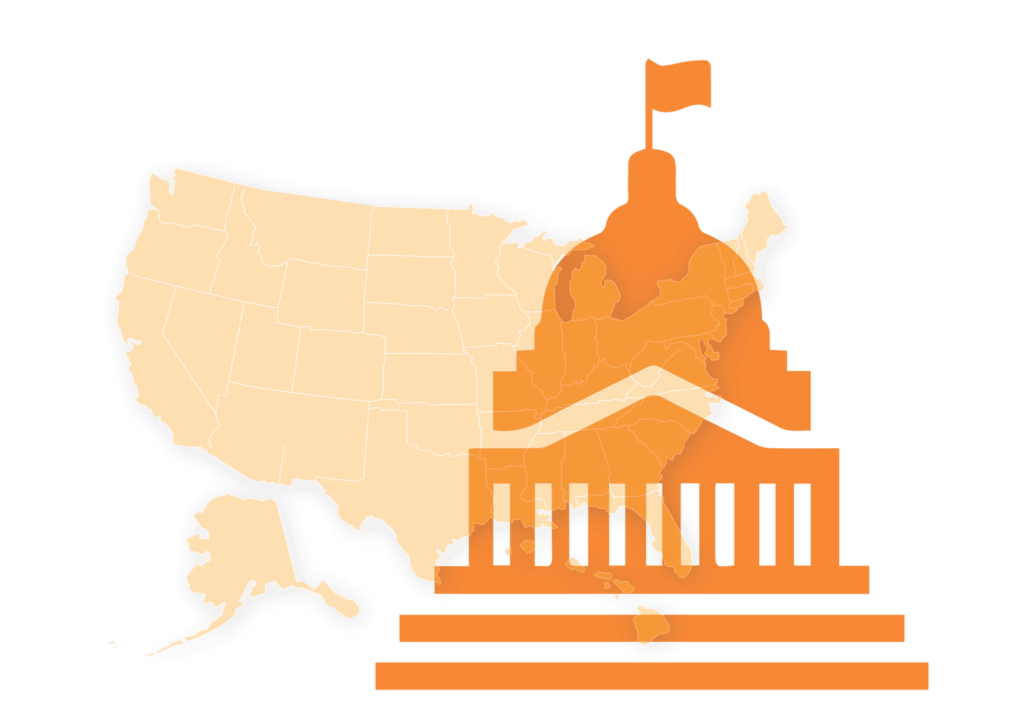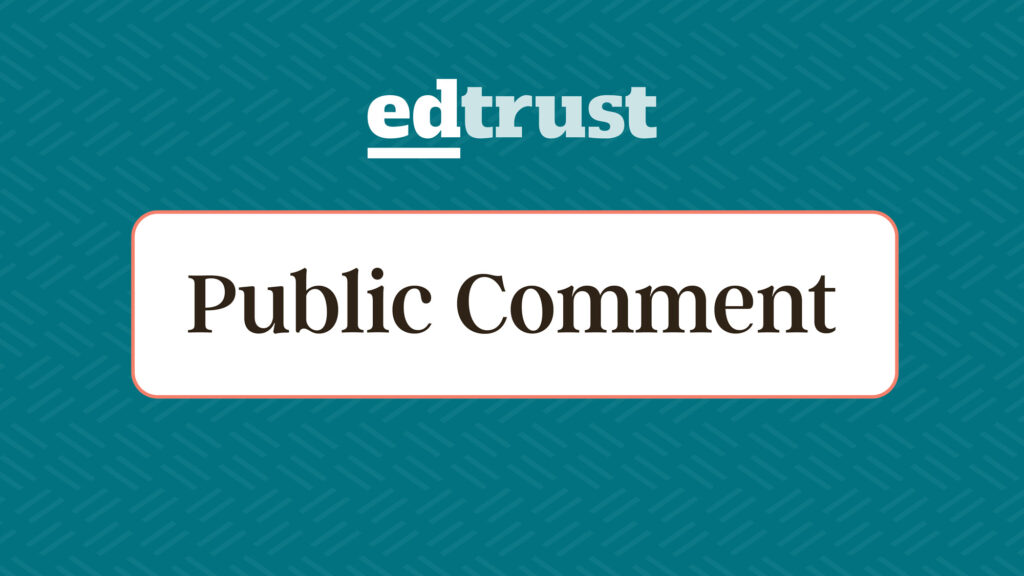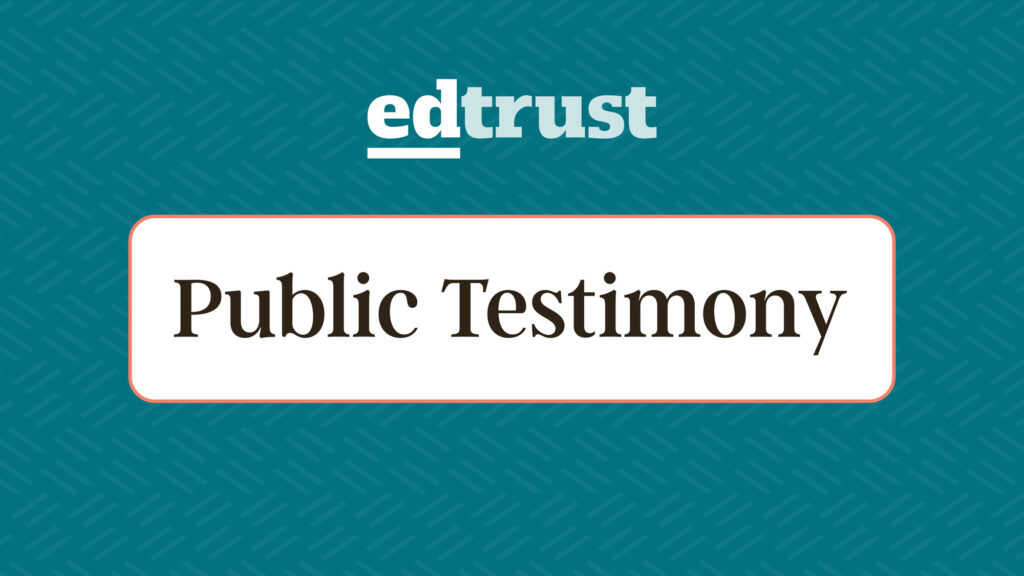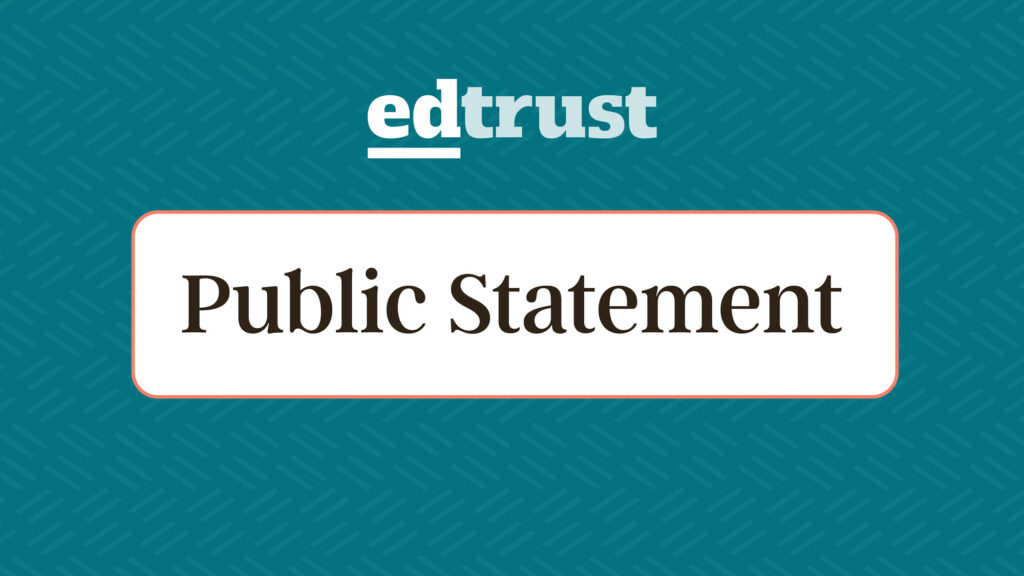Dear Chairwoman DeLauro and Ranking Member Cole:
On behalf The Education Trust, an organization dedicated to closing the long-standing gaps in opportunity and achievement that separate students from low-income backgrounds and students of color from their peers, we write to you regarding proposed funding levels for fiscal year 2022. As an organization committed to education equity, our proposals pertain to federal funding for programs contained in the FY 2022 Labor, Health and Human Services, Education and Related Agencies (L-HHS-ED) Appropriations bill.
It is important to acknowledge that this year’s appropriations process is occurring as the government responds to the damage wrought by the COVID-19 pandemic. The Education Trust appreciates the actions taken in prior relief packages to address the host of issues impacting students, including, but not limited to: setting aside dedicated funding to accelerate learning and respond to students’ social and emotional needs; connecting students to home broadband; dedicating funding to meet college students’ emergency needs, and passing provisions to protect underserved K-12 students from disproportionate state and district funding cuts. In light of the separate American Jobs Plan and American Families Plan packages being discussed in Congress alongside the FY 2022 appropriations process, and given the continuing needs of the students in communities we seek to serve, we call on Congress to include in any possible legislative vehicle provisions that do the following:
- Double the Pell Grant in the face of widespread job loss, uncertainty about college enrollment, and structural racial and financial inequities in college access and attainment;
- Create a federal-state partnership in higher education to enable a pathway to debt-free college for millions of students;
- Create a dedicated higher education funding stream to promulgate more evidenced-based, wraparound service programs for college students;
- Invest in new and existing federal programs to ensure access to universal pre-kindergarten and affordable child care, with a particular emphasis on prioritizing those families most affected by the pandemic, preventing harmful disciplinary practices, and collecting better disaggregated data about affordability and access;
- Maintain the suspension of student loan payments and interest for all federal loans, and authorize targeted student loan forgiveness provisions to give relief to millions of borrowers.
We look forward to working with you on these priorities and others during the ongoing relief process as we attempt to chart a more equitable course out of this pandemic and into the future.
We also request that the Labor, Health and Human Services, Education, and Related Agencies Appropriations bill make substantial investments in excess of those made during prior cap-limited years to ensure that essential education programs have the resources they need. While there are many programs under your jurisdiction that are critical to advancing equity, The Education Trust is focused on the following during the FY 2022 appropriations process:
- Strengthening the Pell Grant program by doubling the maximum award, building on the Biden administration’s proposed $1,800 increase;
- Increasing support for districts and schools serving students from low-income backgrounds and students of color by increasing funding for Title I-A of the Every Student Succeeds Act to $20 billion, and making access to this new aid conditional on state and district implementation of formula reforms that increase equity by targeting additional funding to under-resourced districts;
- Supporting teachers and school leaders by funding each of the following programs at the suggested levels:
- the ESSA’s Title II-A ($3 billion);
- the Teacher and School Leader Incentive Program (TSLIP) ($200 million);
- the Supporting Effective Educator Development Program (SEED) ($140 million);
- the Higher Education Act’s Title II Teacher Quality Partnership grants ($300 million); and
- the School Leader Recruitment and Support Program ($30 million).
- Finally, we request that the Augustus Hawkins Centers, which support enhanced educator preparation for teaching candidates at historically Black colleges and universities (HBCUs) and minority-serving institutions (MSIs), receive $40M in funding for FY22.
We are encouraged by the slight increase in funding levels provided by the House Subcommittee on Labor, Health and Human Services, Education and Related Agencies in the FY 2021 appropriations cycle for some of these initiatives, as well as the uncapped nature of this year’s appropriations process, and urge increased support for these critical programs.
Strengthening the Pell Grant Program
The Pell Grant program is the cornerstone of federal financial aid; the program benefits over 7 million students annually. Over one-third of White students, 60% of Black students, and nearly half of Latino students rely on Pell Grants every year. Pell Grant dollars are also well-targeted to those in need: 83% of Pell recipients come from families with annual incomes at or below $40,000, including 44% with annual family incomes at or below $15,000.
The Pell Grant program’s impact is diminishing because the maximum award has failed to keep pace with the rapidly rising cost of college over the past several decades. In 1980, the maximum Pell Grant award covered 77% of the cost of attendance at a public university. Today, it covers just over 28%, the lowest portion in over 40 years. If the maximum award continues to stagnate, the grant will cover just one-fifth of college costs in 10 years. This erosion has inspired nearly 1,200 institutions and organizations to write to Congress and ask that the Pell Grant be doubled via Congressional action this year.
We appreciate previous increases to the maximum award in prior appropriations bills and we respectfully request that you continue to increase the maximum award amount. For FY 2022, Congress should double the maximum award, building on the Biden administration’s proposed $1,800 increase. Congress can also use potential American Jobs Plan and American Families Plan legislation as a vehicle to reverse the downward trend of Pell’s purchasing power by doubling the maximum award through expanding the mandatory funding stream, ensuring that the maximum Pell award covers at least half of the cost of attendance at a public four-year institution.
Supporting Districts and Schools Serving Underserved Students
The Education Trust is very supportive of the proposed $20 billion funding increase in the President’s FY 2022 budget request for Title I. However, it is important to note that the vast majority of public education funding is distributed via formulas at the state and local levels. Therefore, any federal funding increases of this size should be accompanied by levers that encourage states and districts to address the inequities inherent in those formulas. This is a tremendous opportunity to spark systemic reform of a status quo that sends $23 billion more to predominantly White school districts than predominantly non-White school districts. We urge the committee to think boldly about how to make the overall education funding system more equitable.
Supporting Teachers and School Leaders
Research and experience show the powerful impact that teachers and school leaders have on student learning. ESSA’s Title II-A, TSLIP, and SEED provide grants to states and districts that can be used to, among other things, address inequities in access to effective teachers and school leaders, provide professional development, improve data systems, and improve teacher recruitment and retention. States and districts can also apply for additional competitive grant dollars for programs targeted on specific, evidence-based strategies for improving teacher and school leader effectiveness and increasing educator diversity. Additionally, HEA’s Title II Teacher Quality Partnership grants (TQP), awarded to partnerships of high-need districts and teacher preparation programs at institutions of higher education, can be used to recruit underrepresented populations to the teaching profession. As Ed Trust’s work continues to demonstrate the positive impact that diverse teachers and school leaders of color can have on the academic achievement of both students of color and White students, we remain supportive of federal dollars to increase and bolster the diversity of the educator pipeline.
At a minimum, in FY 2022, Congress should increase ESSA’s Title II-A (Supporting Effective Instruction), the Teacher and School Leader Incentive Program (TSLIP), the Supporting Effective Educator Development (SEED) program, and HEA’s Title II Teacher Quality Partnership (TQP) grants to: $3B, $200M, $140M, and $100M, respectively.
Research has also shown that students of color benefit tremendously from having teachers of color, particularly one of the same racial background: they are less likely to be chronically absent or suspended from school, more likely to be recommended for gifted and talented programs, and low-income Black students who have a Black teacher for at least one year in elementary school are less likely to drop out of high school and more likely to consider college. And while students of color make up the majority of students in public schools, the diversity gap for teachers of color still exists across every state.
The nationwide impact of HBCUs, MSIs, Hispanic-serving institutions (HSIs), and tribal colleges and universities (TCUs) on producing teachers of color cannot be overstated. HBCUs, TCUs, and MSIs, collectively, award only 11% of the nation’s bachelor’s degrees in education, yet they produce more than 50% of the bachelor’s degrees earned in education by Hispanic, Native Hawaiian and Pacific Islander students. HBCUs graduate approximately 50% of the nation’s African American K-12 teachers with bachelor’s degrees. HSIs prepare 90% of Hispanic teachers, and along with other MSIs, constitute a vital pipeline to maintain diversity among our nation’s teachers.
In light of the importance of these institutions and the increased needs they experience as result of graduating an outsized portion of the nation’s teachers of color, we request that the Augustus Hawkins Centers of Excellence Grant program receive funding for the first time since its creation in the bipartisan Higher Education Act of 2008, totaling $40 million. The program would provide critical funding for these key institutions to provide increased and enhanced clinical experience and increased financial aid to prospective teachers of color, who face higher burdens in college access and affordability than their White peers.
For FY 2022, Congress should fund the Augustus Hawkins Centers of Excellence Grant Program at $40M.
Finally, landmark research funded by the Wallace Foundation has found “virtually no documented instances of troubled schools being turned around without intervention by a powerful leader,” and the School Leader Recruitment and Support Program (SLRSP) is the only federal program specifically focused on investing in evidence-based, locally driven strategies to strengthen school leadership in high-need schools. A recently concluded seven-year study of school districts that created pipelines to develop school leaders saw gains in student achievement over time, showing how a sustained initiative can demonstrate positive effects on student learning.
During the past decade, we have learned a lot about what works in education leadership — lessons made possible, in part, by federal investments in the School Leader Program (the previous iteration of the SLRSP). There is still a great deal of work to do, especially when it comes to identifying and efficiently preparing effective turnaround leaders, as well as sustainably supporting them to accelerate academic achievement, close gaps, and maintain improvement over time for all students and in every community. The SLRSP is a key lever for seeding the next generation of effective school leader development programs, promoting equity, advancing ongoing innovation, and sharing cutting-edge lessons on transformational leadership with the broader field.
For FY 2022, Congress should restore and increase funding for the School Leader Recruitment and Support Program to $30M, doubling its FY 2017 appropriation level.
The Education Trust looks forward to working with Congress to allocate federal funds in a way that addresses the critical equity gaps that our nation’s students from low-income backgrounds and students of color continue to face. We are happy to respond to any questions or concerns that you may have on these topics and we thank you for your consideration.
Sincerely,






 August 28, 2025 by
August 28, 2025 by 
